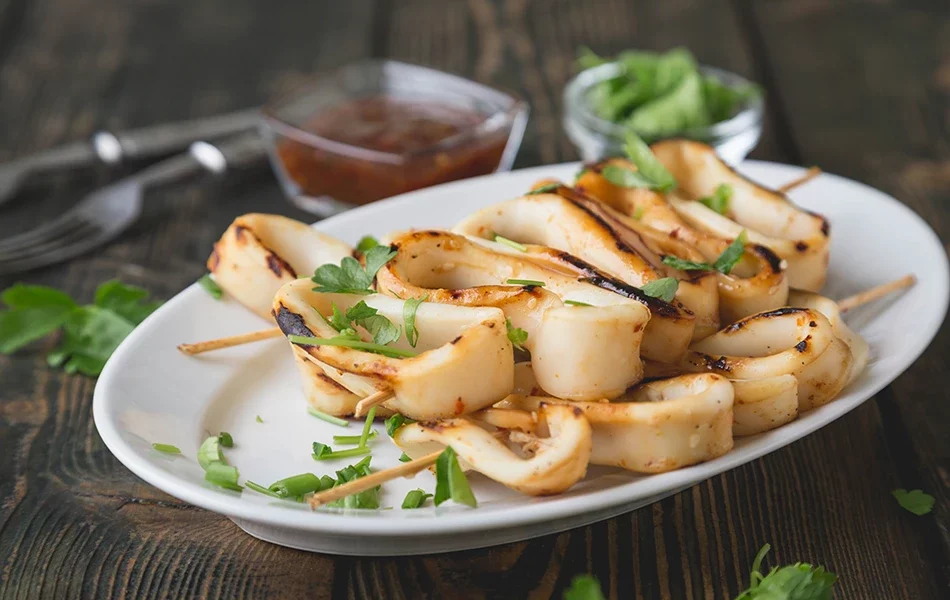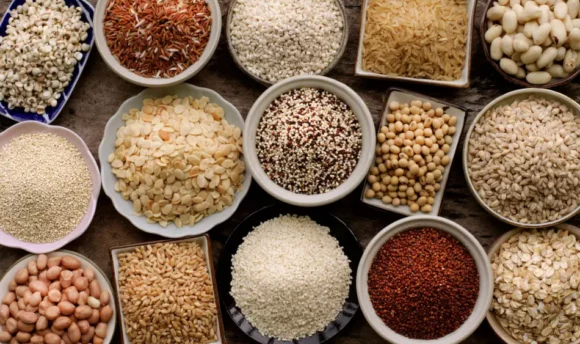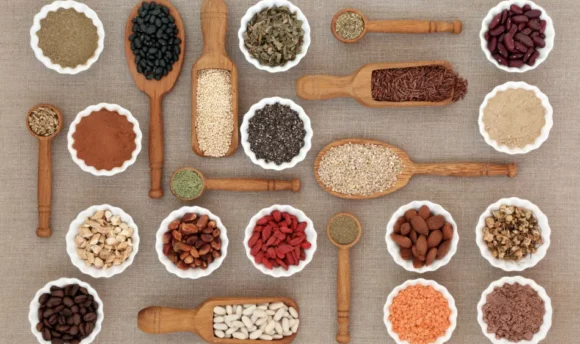Is Squid Healthy? Cholesterol, Nutrition Facts, and Benefits
Squid is a popular seafood worldwide due to its versatility and nutritional profile. Stay with us for more information on its nutrition and benefits!

If you enjoy seafood, you’ve probably tried squid, a family of 2-tentacled, 8-armed mollusks that is related to octopus and cuttlefish.
This culinary delicacy is consumed in many ways, either raw, fried, or sautéed with vegetables, making it popular in different dishes of those who enjoy its interesting texture and fresh sea flavor.
The most notorious thing about squid is that it has a nutritional profile that distinguishes it from other seafood due to its high cholesterol content.
Join the Health Reporter team to evaluate the nutritional facts of squid and learn how to prepare it in a healthy way.
Is Squid Healthy?
Yes, squid is a healthy food because it is a source of protein that also contains vitamins, minerals, and omega-3 fatty acids. The best thing is that you can take advantage of its proteins in a weight loss diet because it is a low-calorie food.
To ensure its benefits, it is important to cook it properly since it is common in restaurants to offer fried squid that is high in saturated fats.
5 Health Benefits of Squid
#1 Promotes bone and dental health
Squid is rich in phosphorus, a mineral that plays important roles in metabolism and in the maintenance of bone mass, including teeth. Phosphorus also promotes protein synthesis, which is necessary for the growth of muscles, tissues, and cells throughout the body.
Phosphorus deficiency can cause bone pain, muscle weakness, and osteomalacia.
#2 Supports the heart and red blood cells
One of the most important minerals for cardiovascular health is potassium, which is found in squid in generous amounts, specifically 246mg per serving.
Potassium helps control hypertension, decreases endothelial damage, and may reduce the risk of developing heart disease. The omega-3 fatty acid content of squid is also a key factor in the prevention of cardiovascular disease.
In addition, thanks to its iron and vitamin C content, squid can promote the increase of red blood cells, which prevents anemia. These cells are important for transporting oxygen to all tissues in the body.
#3 Supports energy production
Squid is a seafood with a high mineral content, making it a regulatory source of energy production.
Because it is low in calories, squid does not provide energy directly, but it does provide minerals that are part of enzymes and other proteins involved in metabolism that are necessary for the production and use of energy, such as iron, phosphorus, and zinc.
#4 It favors the maintenance of muscle mass
In terms of macronutrients, squid is rich in protein, low in saturated fat, and very low in carbohydrates. This makes it an ideal food for dieters who need to increase their protein intake in order to build or maintain muscle mass.
#5 Helps take care of your nervous system
Vitamin B12 is essential for maintaining a healthy nervous system, and squid is a good source of this vitamin, with 1.3µg in 100 grams. Vitamin B12 deficiency can cause neurological damage manifested by tingling hands and feet, loss of reflexes, and even dementia.
In addition, the omega-3 fatty acid content facilitates communication between neurons and the synthesis of neurotransmitters relevant to the brain.
2 Disadvantages of Squid
#1 Allergies
Like all shellfish, squid can cause allergies in sensitive individuals because it contains tropomyosin, the main allergen in seafood.
Tropomyosin is an allergy-causing protein found in most marine species, including commonly consumed species such as Japanese flying squid or Todarodes pacificus.
#2 Cholesterol
Surprisingly, squid is one of the seafood species in the ocean with the highest amounts of cholesterol. The American Heart Association recommends following a diet containing less than 300mg of cholesterol per day, and only one serving of squid contains 233mg of cholesterol.
Nutrition Facts of Squid
Nutritional value (per 100g)
| Calories/Nutrient (per 100g) | Amount |
| Calories (kcal) | 92 |
| Net Carbs (g) | 3.08 |
| Fiber (g) | 0 |
| Sugar (g) | 0 |
| Fats (Total) | 1.38 |
| Protein (g) | 15.6 |
| Sodium (mg) | 44 |
| Cholesterol (mg) | 233 |
| Total saturated fat (g) | 0.358 |
Source: https://fdc.nal.usda.gov/fdc-app.html#/food-details/174223/nutrients
Low in calories
Seafood is characterized by being very low in calories, and squid is no exception, making it an ideal choice for weight loss diets. With only 92 calories per 100 grams, it can be eaten as a main dish without affecting your progress.
High in proteins
Squid, like the meat of many animals, is a source of high biological value protein. This means that they are easily utilized by the body to perform very important functions such as muscle and tendon formation.
Low in saturated fats
Raw squid contains only 0.358g of fat per serving, making it a light food to include in the diet as long as it is prepared properly. Fried calamari with refined oils should be avoided to avoid extra calories, and the use of poor-quality oils can add large amounts of trans and saturated fats.
Rich in minerals and vitamins
Squid, like most seafood, has a high vitamin and mineral profile that is essential for bodily functions. The minerals that can be obtained in greater quantities when consuming squid are potassium, zinc, iron, magnesium, phosphorus, and iodine.
As for vitamins, squid provides a good amount of vitamins B12, E, A, and C.
High in cholesterol
Despite being low in fat, squid is one of the seafood that has the highest amount of cholesterol, with 233mg, followed by shrimp, which has 161mg of cholesterol per serving.
However, seafood is highly recommended for its health benefits, such as cardiovascular protection and its positive effects on the prevention of heart disease.
Squid vs. Octopus
Both octopus and squid seem to be two of the most consumed seafood protagonists. But although they belong to the same family, the octopus has some advantages for weight loss due to its lower amount of calories and cholesterol.
| Squid | Octopus | |
| Protein (per 100g) | 15.6g | 14.9g |
| Calories (per 100g) | 92g | 82g |
| Fats (per 100g) | 1.38g | 1.04g |
| Cholesterol | 233mg | 48mg |
| Taste | The texture of squid meat is rubbery, with a mild, fish-like flavor. | Octopus meat is softer and richer in flavor with slightly sweet notes similar to lobster and mussels. |
| Differences | They have an elongated and conical body, with 2 tentacles on each side of their body and 8 limbs. | They have a round body represented by an oval head and 8 limbs with suckers that allow them to adhere to surfaces. |
Source: https://fdc.nal.usda.gov/fdc-app.html#/food-details/174218/nutrients
Healthy Squid Recipe
Ingredients
- 700g squid cut into rings
- 1 onion
- 4 cloves garlic
- 4 boiled and peeled tomatoes
- 1 red bell pepper
- 1 tsp oregano
- 1 pinch thyme
- A touch sea salt
- 1 pinch cayenne pepper (spicy)
- Black pepper to taste
- 1 tbsp extra virgin olive oil
- Chopped fresh parsley for garnish
Directions
- Blend the cooked and peeled tomatoes until the sauce is homogeneous. Set aside.
- In a hot frying pan with olive oil, fry the squid until it begins to color. In the last seconds, add salt and pepper and remove from the pan.
- In the same pan, sauté the finely chopped onion with the julienned bell pepper and the crushed garlic.
- When the vegetables begin to soften, add the tomato sauce and spices. Cook until the sauce turns dark red.
- Finally, add the squid and turn off the heat. Serve with chopped fresh parsley on top.
This is a very light, low-fat, and delicious recipe that can be eaten alone or accompanied by brown rice or a fresh salad. There are several ways to combine squid to include it in a weight loss diet without adding too much fat like the typical options in restaurants.
If you need more ideas, we recommend you check out some nutrition apps that contain a lot of healthy recipes.
FAQs
Yes, it is common for some people to eat some types of raw squid.
No, although you can get some specimens contaminated with mercury, squid is one of the marine species with lower levels of this metal.
A Word From a Nutritionist
Squid is a good source of protein that can be included in a weight loss diet. In addition, it is very low in carbohydrates, so it can be consumed if you follow the ketogenic diet.
Despite its high cholesterol content, scientists agree that dietary cholesterol has no relevant effect on blood cholesterol levels and that it is more important to limit saturated and trans fats to maintain a healthy heart.
This can be achieved by limiting the use of butter and refined oils in cooking, preferring healthier preparations such as boiled squid, and avoiding fried squid.
However, despite its saturated fat content, fried squid can be enjoyed occasionally as part of a balanced diet.
Conclusion
Squid is a relatively healthy food with a nutritional profile very rich in minerals and vitamins that promote cardiovascular and nervous health.
People who are not allergic to seafood can cook it in a healthy way to safely consume it and enjoy its benefits.

















































 Select your language:
Select your language: 








